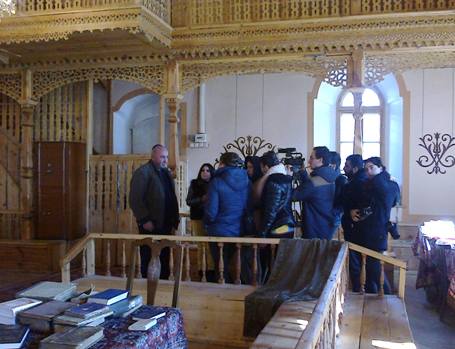Natia Gogolashvili
On February 9, Human Rights Center organized a media-tour in the villages of Akhaltsikhe and Adigeni municipalities. Journalists of printed media, Radio and TV-companies and online newspapers studied the conditions of the places of worship of religious minorities. Representatives of the regional media also participated in the tour.
The media-tour was organized by Human Rights Center in the frame of the project Preservation of the Cultural Heritage of Religious Minorities, which was implemented with financial support of the Government of Canada. The project aimed to raise public awareness about the state of the places of worship of religious minorities in Georgia.
In December 2015 the representatives of Human Rights Center paid field visits to different regions of Georgia – Racha, Samtskhe-Javakheti, Imereti, to Tbilisi and Autonomous Republic of Adjara, where they studied conditions of synagogues, mosques, catholic churches and churches of Armenian Apostolic Diocese.
The media-tour aimed to visit the two synagogues in Guramishvili Street in Akhaltsikhe, a mosque in Sakuneti village, and mosques in the villages of Adigeni and Plate.
Upper Synagogue in Akhaltsikhe was constructed in 1963. It has status of the cultural heritage and the oldest among currently existing synagogues in Georgia. In 2012, it was reconstructed when the Rabat Fortress was rehabilitated in Akhaltsikhe.
Lower Synagogue in Akhaltsikhe was constructed in 1902. During the Soviet Union different institutions functioned in it: a library, a cinema-club, a billiard hall and a boxing hall. Although the building construction is in good conditions, it is absolutely looted and abandoned. When the Rabat Fortress was rehabilitated in Akhaltsikhe, the authority planned to reconstruct the lower Rabat District too but after 2012 nothing was done there.
The journalists evaluated the state of the places of worship and interviewed local inhabitants. They identified the phobias and radical feelings of local orthodox population towards Georgian Muslims. The local orthodox people told journalist that they are against restoration of the ruined mosque. They prefer to pull it down. The local Muslims think it is important to save the historical mosques from deconstruction.
It is noteworthy that in the frame of the ongoing project, Human Rights Center addressed the National Agency for the Preservation of Cultural Heritage and requested to grant status of the cultural heritage to the mosques in Adigeni and Plate villages. The Council of the Agency studied the petition and issued positive recommendations on it. Considering the fact that the mosques in the aforementioned villages are in poor conditions, the Center hopes the status will save them from full deconstruction.
Plate Mosque was constructed in 1927 by local Muslim Meskhs. Today it still can be restored. Several years ago, under the supervision of the leader of the Zarzma Monastery Father Nikoloz, (Getsadze) the façade stones of the Plate Mosque were taken to the Zarzma Monastery to build adjacent buildings in it. On December 17, 2014, Human Rights Center appealed the Chief Prosecutor’s Office of Georgia to request investigation into the alleged premeditated damage of the historical mosque in Plate village. However the investigation has not started. The state still has not reacted to the fact yet.
Ruins of the historical mosque attracts attention in the center of Adigeni village, which was reportedly built in 1885-86.Today the mosque is on the edge of collapse – it does not have a roof and walls may fall down any moment. Specialist of the cultural heritage said full or partly reconstruction of the building as well as its conservation is still possible.
In the frame of the ongoing project Human Rights Center addressed the National Agency for the Preservation of Cultural Heritage and requested to give status of the cultural heritage to the mosques in Plate and Adigeni. The Council discussed the petition and issued positive recommendation. On February 8, based on the decree of the Minister of Culture, Adigeni and Plate mosques received status of the cultural heritage.
There are few meters between a mosque and an orthodox church in Sakuneti village. Both of them have status of the cultural heritage. The Church is functioning but the mosque is abandoned. The latter received the status in 2012 and according to the inscription it was constructed in 1927.
Director General of the National Agency Nikoloz Antidze said the state is responsible to take care of the cultural heritage, but all monuments cannot be restored and rehabilitated in one year. At the same time the state funds are not enough for the preservation of the heritage. It is necessary that the society also participated in this process and also big part of the heritage should have owners.
During the media-tour representatives of Human Rights Center informed journalists about present conditions of historical mosques and synagogues in the region. The journalists visited the places of worship and interviewed local people. Orthodox inhabitants of Sakuneti, Plate and Adigeni villages openly declared before cameras that they are against functioning of the mosques. The journalists interviewed representative of the Jewish community in Akhaltsikhe Simon Revishvili, who spoke about migration of Georgian-Jewish people to Israeli that caused functionless of the synagogues in Akhaltsikhe.
Mr. Amar Karrer, Coordinator at the Canada Fund for Local Initiatives, Embassy of Canada also participated in the media-tour. He told journalists that the Government of Canada supports initiatives related with the defense of rights of religious minorities. Consequently, with the financial support of the Government of Canada several nongovernmental organizations, including Human Rights Center, implements projects in Georgia which aim to identify problems of religious minorities and their advocacy.
The article was prepared in the frame of the project implemented with financial support of the Government of Canada. This article does not necessarily reflect the views of the donor.
Human Rights Center bears sole responsibility for the content of the article.
News
December 13, 2023
Ethnic minorities outside the peace dialogue
November 6, 2023
‘Peace’ agenda of political parties
Popular
Articles
February 13, 2024




